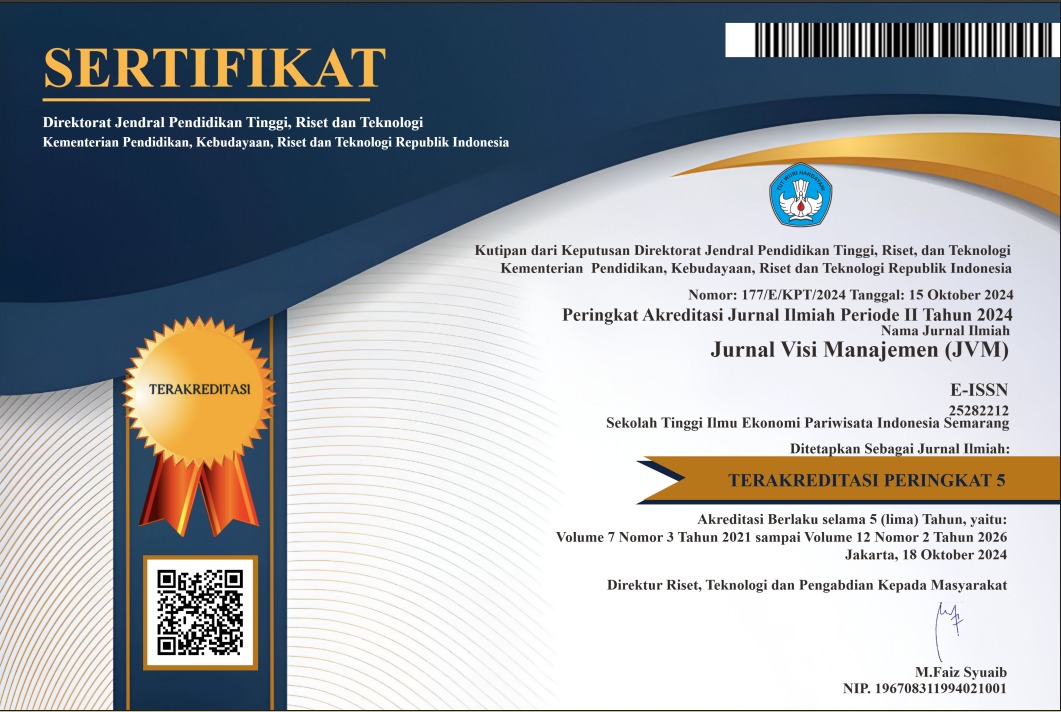Work Motivation and Environment Effects on Maritime Warehouse Performance
DOI:
https://doi.org/10.56910/jvm.v11i3.820Keywords:
work motivation, work environment, employee performance, maritime logistics, IndonesiaAbstract
This qualitative research investigates the influence of work motivation and work environment on employee performance within PT Yusen Logistic Indonesia's warehouse division. Through comprehensive interviews with maritime professionals, educators, and industry experts, this study addresses critical gaps in understanding workforce dynamics in maritime logistics operations. The research employed thematic analysis of semi-structured interviews with 45 participants across three stakeholder groups: operational staff, maritime educators, and industry professionals. Findings reveal that intrinsic motivation factors, particularly career development opportunities and safety recognition, demonstrate stronger correlation with sustained performance than monetary incentives. Work environment quality, including infrastructure adequacy and shift management, serves as a significant moderator affecting motivation–performance relationships. In addition, this research highlights that supportive leadership and open communication further strengthen employee engagement and commitment in high-pressure warehouse operations. Respondents consistently emphasized the importance of aligning organizational goals with individual career aspirations, particularly in a sector where safety and efficiency are paramount. The study also identifies that investment in ergonomic facilities, digital monitoring systems, and structured training programs reduces fatigue and error rates, thus promoting both productivity and safety compliance. The implications extend beyond company-level management to broader maritime education and policy-making. The integration of motivational strategies into vocational curricula can better prepare graduates for the realities of port and logistics operations. Moreover, the findings contribute to developing sustainable logistics practices that balance efficiency, employee well-being, and long-term organizational competitiveness. Overall, the research provides evidence-based recommendations for maritime vocational training programs, human resource management, and port operations strategies in Indonesia’s rapidly growing logistics sector.
References
Bilal, A., Xiao-ping, L., Nanli, Z., Sharma, R., & Jahanger, A. (2021). Green technology innovation, globalization, and CO2 emissions: Recent insights from the OBOR economies. Sustainability, 13(1), 236. https://doi.org/10.3390/su14010236
Caldas, P., Pedro, M. I., & Marques, R. C. (2024). An assessment of container seaport efficiency determinants. Sustainability, 16(11), 4427. https://doi.org/10.3390/su16114427
Caldeirinha, V., Felício, J. A., Pinho, T., & Rodrigues, R. (2024). Fuzzy-set QCA on performance and sustainability determinants of ports supporting floating offshore wind farms. Sustainability, 16(7), 2947. https://doi.org/10.3390/su16072947
Du, S., Zhang, H. S., & Kong, Y. (2023). Sustainability implications of the Arctic shipping route for Shanghai port logistics in the post-pandemic era. Sustainability, 15(22), 16017. https://doi.org/10.3390/su152216017
Kim, B., Kim, G., & Kang, M.-H. (2022). Study on comparing the performance of fully automated container terminals during the COVID-19 pandemic. Sustainability, 14(15), 9415. https://doi.org/10.3390/su14159415
Kim, S.-K., Choi, S., & Kim, C. (2021). The framework for measuring port resilience in Korean port case. Sustainability, 13(21), 11883. https://doi.org/10.3390/su132111883
Liao, Y.-H., & Lee, H.-S. (2023). Using a directional distance function to measure the environmental efficiency of international liner shipping companies and assess regulatory impact. Sustainability, 15(4), 3821. https://doi.org/10.3390/su15043821
Mwendapole, M. J., & Jin, Z. (2021). Evaluation of seaport service quality in Tanzania: From the Dar Es Salaam seaport perspective. Sustainability, 13(18), 10076. https://doi.org/10.3390/su131810076
Paridaens, H., & Notteboom, T. (2021). National integrated maritime policies (IMP): Vision formulation, regional embeddedness, and institutional attributes for effective policy integration. Sustainability, 13(17), 9557. https://doi.org/10.3390/su13179557
Pian, F., Xu, L., Chen, Y., & Lee, S.-H. (2020). Global emission taxes and port privatization policies under international competition. Sustainability, 12(16), 6595. https://doi.org/10.3390/su12166595
Qi, J., Wang, S., & Zheng, J. (2022). Shore power deployment problem—A case study of a Chinese container shipping network. Sustainability, 14(11), 6928. https://doi.org/10.3390/su14116928
Sunny, A. R., Mithun, M. H., Prodhan, S. H., Ashrafuzzaman, M., Rahman, S. M. A., Billah, M. M., Hussain, M., Ahmed, K. J., Sazzad, S. A., Alam, M. T., Rashid, A., & Hossain, M. M. (2021). Fisheries in the context of attaining sustainable development goals (SDGs) in Bangladesh: COVID-19 impacts and future prospects. Sustainability, 13(17), 9912. https://doi.org/10.3390/su13179912
Wilson, T., Cooley, S. R., Tai, T. C., Cheung, W. W. L., & Tyedmers, P. (2020). Potential socioeconomic impacts from ocean acidification and climate change effects on Atlantic Canadian fisheries. PLoS ONE, 15(1), e0226544. https://doi.org/10.1371/journal.pone.0226544
Zhang, W., Zhang, Y., & Qiao, W. (2022). Risk scenario evaluation for intelligent ships by mapping hierarchical holographic modeling into risk filtering, ranking and management. Sustainability, 14(4), 2103. https://doi.org/10.3390/su14042103
Zhou, K., Yuan, X., Guo, Z., Wu, J., & Li, R. (2024). Research on sustainable port: Evaluation of green port policies on China's coasts. Sustainability, 16(10), 4017. https://doi.org/10.3390/su16104017
Zhu, J., Yan, W., He, J., Hafeez, M., & Sohail, S. (2024). RETRACTED: Exploring the convergence of ICT, digital financial inclusion, environmental pressures, and free trade and their significance in driving sustainable green investment initiatives under carbon neutrality targets. Heliyon, 10(11), e31102. https://doi.org/10.1016/j.heliyon.2024.e31102
Downloads
Published
How to Cite
Issue
Section
License
Copyright (c) 2025 Jurnal Visi Manajemen

This work is licensed under a Creative Commons Attribution-ShareAlike 4.0 International License.







